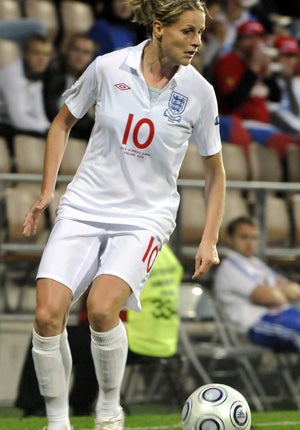Volley of support for women's game
The ladies' game has gone unheralded, but can the success of England and Kelly Smith in Finland change all that? Glenn Moore thinks so

Your support helps us to tell the story
From reproductive rights to climate change to Big Tech, The Independent is on the ground when the story is developing. Whether it's investigating the financials of Elon Musk's pro-Trump PAC or producing our latest documentary, 'The A Word', which shines a light on the American women fighting for reproductive rights, we know how important it is to parse out the facts from the messaging.
At such a critical moment in US history, we need reporters on the ground. Your donation allows us to keep sending journalists to speak to both sides of the story.
The Independent is trusted by Americans across the entire political spectrum. And unlike many other quality news outlets, we choose not to lock Americans out of our reporting and analysis with paywalls. We believe quality journalism should be available to everyone, paid for by those who can afford it.
Your support makes all the difference.It was a goal to grace any match, but being the decisive goal in a tie England had to win to stay in a major tournament means it will go down in folklore.
In some quarters anyway. But Kelly Smith's goal for England against Russia on Saturday was in the Women's Euro 2009 tournament, not the male equivalent, which meant it was seen only on Eurosport, and not many people were watching. Even YouTube only has a poor quality clip so far.
Nevertheless, Smith's goal underlined the quality in the contemporary women's game. For a long time women's football was hampered by weaknesses in key areas such as goalkeeping and heading which devalued the game. The goalkeeping remains patchy but in every other respect the female game is coming of age. Having belatedly watched a match live and in its entirety last week this observer has been converted to the belief that the ladies' game is worth viewing.
It is hard to avoid being patronising in articles like this, so apologies in advance, but I was impressed, and surprised, by much of the football I saw at Euro 2009 in Finland. Although several England players felt they played badly against Italy there was some excellent play from both sides.
It was a proper football match, albeit played at a significantly slower tempo than the men's game. Pace and strength, though, are not everything, as many spectators at professional men's matches this weekend, including Premier League games, will agree. For a start it means the ball is played on the ground more often.
Smith, though troubled by a gammy knee, stood out. The US-based 30-year-old is clearly a class act as her goal against Russia underlined. Having controlled the goalkeeper's clearance on her instep she volleyed in from the edge of the centre circle. Admittedly the Russian keeper will not want to see it again – but there can be no faulting the bravery of England's Rachel Brown, or the agility of Italy's Anna Picarelli.
Nor is there any doubting the players' commitment. Millwall Lionesses, of the FA Tesco Women's Premier League, each pay £380 a year to cover kit, transport, and other things. Smith's commitment was expressed in her willingness to have pain-killing injections to play this week. "I'm playing through a little bit of pain but it's worth it for this," she said. "Playing at this level for your country, you are willing to do anything." It could be John Terry talking.
There is a lack of depth, and much of the domestic game is poor. This will change, for the sport is growing quickly, especially if the FA back the planned semi-pro summer league.
The women's game will never be as fast, athletic or powerful as the men's, even when the talent pool grows and increased funding allows players to train more, but why should that be a problem? No one suggests Jessica Ennis's world championship gold is invalid because men do not compete in the heptathlon.
Finland's most prominent female player, Anne Makinen, said before the tournament: "I wish people would stop comparing the men's and women's game. They don't do that in other sports. It's important to accept women's football on its own terms."
Pia Sundhage, who coached the US to Olympic gold, added: "If you truly love football you will enjoy both the men's and women's game."
Join our commenting forum
Join thought-provoking conversations, follow other Independent readers and see their replies
Comments